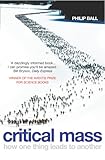Found in 2 comments on Hacker News
mmcnickle · 2012-09-17
· Original
thread
You can't predict how an individual cow will move, but it's perfectly acceptable to use models to predict how cattle generally move. Similar to the way we use models to predict how humans navigate hallways and find paths across grass.[1] When you have a bulk of interacting particles, it tends to remove the "personality" of the individual, leaving you with how the group as a whole will move.
Philip Ball's (former editor of Nature) book Critical Mass[2] is an excellent read about the interesting effects that happen when you look at large number of complex interacting actors. He discusses the effects in traffic, pedestrian models, finance, plant growth etc. I highly recommend it.
[1]http://www.youtube.com/watch?v=8SmRBTJ-jeU This is just a video I picked out quickly, there are much better resources, I just can't find them on my phone.
[2]http://www.amazon.co.uk/Critical-Mass-Thing-Leads-Another/dp...


"In systems where many people are free to choose between many options, a small subset of the whole will get a disproportionate amount of traffic (or attention, or income), even if no members of the system actively work towards such an outcome. This has nothing to do with moral weakness, selling out, or any other psychological explanation. The very act of choosing, spread widely enough and freely enough, creates a power law distribution."
For a much bigger look at similar effects, see Critical Mass by Philip Ball https://www.amazon.co.uk/Critical-Mass-Thing-Leads-Another/d...